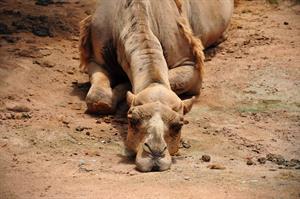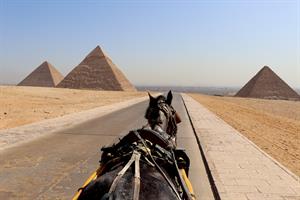PDF chapter test TRY NOW
IN the beginning, when the world was new and the Animals were just beginning to work for Man, there was a Camel, and he lived in the middle of a Howling Desert because he did not want to work. He ate sticks and thorns and prickles, and when anybody spoke to him he said “Humph!” Just “Humph!” and no more.
Presently the Horse came to him on Monday morning, with a saddle on his back and said, “Camel, O Camel, come out and trot like the rest of us.”
“Humph!” said the Camel, and the Horse went away and told the Man.
Explanation:
This is an imaginative story set in a time period where the world had just begun. Animals had to work for humans, and humans fed the animals in turn. Humans had just started domesticating animals. There was a camel that lived in the middle of a desert. The author refers to the desert as "Howling Desert" because he means it is very lonely and deserted. Since there is no sound of any livelihood, only the desert winds were heard like a howl. The camel lived by himself because he did not like to work. One might wonder what he will do for food. The camel ate sticks, thorns and prickles that were easily available around him. Deserts are known for thorny plants like cactus, and usually, animals find it hard to eat them. But the camel was so lazy that he was ready to eat it and remain without doing any work. If someone came and spoke to him, the only answer he gave as "Humph". This was the answer for any question that anyone asked him.

The lazy, lonely camel.

The camel ate sticks, thorns, prickles that he found.
Once a horse came up to him on a Monday morning. He had a seat fastened on his back for the rider to sit on, called a saddle. This meant horses were used to carry people from one place to another, as a means of transport. The horse asked the camel to come out and start running like the rest of them.

Horse, with the saddle - went off to his master.
The camel gave his usual reply, "Humph" and the horse went off to tell the man about the camel.
Meanings of difficult words:
Words | Meanings |
| howling | produce a long wailing sound |
| prickles | small thorns found on plants |
| saddle | a seat fastened on the back of a horse or other animal for riding |
| trot | run with short steps |
Reference:
National Council of Educational Research and Training (2008). How the camel got his hump - Rudyard Kipling (abridged) (pp. 01-06). Published at the Publication Division by the Secretary, National Council of Educational Research and Training, Sri Aurobindo Marg, New Delhi.
